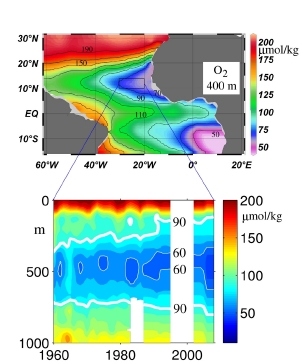May 1 2008
Marine Scientists have made an alarming new discovery. In some regions of the world oceans, oxygen essential for marine organisms is declining. This process might be caused by environmental changes in the context of global warming. A new study lead by Dr. Lothar Stramma from the Leibniz Institute of Marine Sciences (IFM-GEOMAR) in Kiel, Germany, now published in "Science", documents that the oxygen values in tropical oceans at a depth of 300 to 700 metres have declined during the past 50 years. As large marine organisms can either no longer exist in these areas or they would avoid them, the expanding oxygen minimum zones may have substantial biological and economical consequences.
 Oxygen distribution in the Atlantic and time-depth section of the oxygen distribution in the eastern tropical Atlantic
Oxygen distribution in the Atlantic and time-depth section of the oxygen distribution in the eastern tropical Atlantic
The oxygen distribution in the ocean is not homogenous. At the eastern boundaries of the tropical oceans at depths between 200 and 800 metres, there are areas with reduced oxygen, the so-called oxygen minimum zones (OMZ). Rising CO2 levels are causing a temperature increase of the ocean and a general decline of oxygen solubility in the water.
Furthermore, and even more importantly, a reduction of oxygen-rich deep water production in polar regions leads to a reduced oxygen supply in the deep ocean. The expected impacts on subtropical and subpolar regions are larger than in the Tropics. In higher latitudes, the reduction of oxygen has already been proven by observational data. In the Tropics, this was not possible to date due to the lack of sufficient observational data. An international team of researchers, Dr. Stramma from IFM-GEOMAR, together with Dr. Gregory Johnson NOAA, Seattle, Dr. Janet Sprintall from Scripps Institution of Oceanography in San Diego and Dr. Volker Mohrholz from the Institute for Baltic Sea Research in Warnemünde, Germany selected areas with higher data density to document the decline in oxygen. “We found the largest reduction in a depth of 300-700 m in the tropical northeast Atlantic, whereas the changes in the eastern Indian Ocean were much less pronounced”, explains Dr. Stramma. “Whether or not these observed changes in oxygen can be attributed to global warming alone is still unresolved”, Stramma continues. The reduction in oxygen may also be caused by natural processes on shorter time scales” Nevertheless, the results are consistent with model results which predict a further decline in the future.
If this trend continues, it will be of particular importance for the tropical regions investigated in this study, because the oxygen concentrations are quite low and a further reduction may lead to existential problems for marine organisms and to changing biogeochemical conditions.
The results of this study are an important milestone for the ongoing work of the new Collaborative Research Centre (SFB 754) “Climate – Biogeochemistry Interactions in the Tropical Ocean” funded by the German Research Foundation, which started its first phase in January 2008 in close cooperation with the University of Kiel. The SFB aims to better define the interactions between climate and biogeochemistry on a quantitative basis.